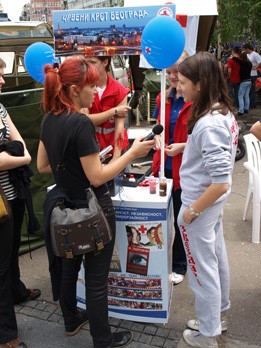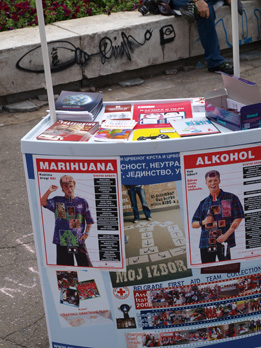Prevention of drug abuse
"Здравље је стање потпуног, физичког, психичког и социјалног благостања, а не само одсуство болести"(дефиниција Светске здравствене организације). У том смислу треба да размислимо да ли својим начином живота само трошимо и смањујемо резерве здравља и да ли довољно чинимо да очувамо и унапредимо своје здравље
The Red Cross of Serbia also works on raising public’s awareness on the damaging effects of abuse of psychoactive substances. Preventing drug abuse among younger people is one of the important objectives of the Red Cross of Serbia and is conducted through preventive educational activities and continued campaigns. Lectures and workshops organised by the Red Cross of Serbia reach more than 20,000 children and young people as well as more than 2,000 parents.
Substance abuse, abuse of illegal drugs but also non-medical use of prescription drugs is increasingly becoming a serious public health problem as well as a societal issue. It can be said that in early 21 century substance abuse has become a non-infectious epidemic which makes the continued prevention activities of the Red Cross of Serbia necessary and important.
All the activities are being implemented through public and selective education. Public education encompasses information and awareness raising campaigns on the dangers of psychoactive substances. Selective education targets specific subsets of population: high school students, university students, parents, teachers, lecturers, persons at risk etc.
Primary prevention – preventing a person from developing an addiction is of the highest importance. To achieve this it is necessary to provide continuing education on the risks related to use of psychoactive substances (coffee/ caffeine, tobacco/ nicotine, alcohol, drugs) and this is why the Red Cross of Serbia uses comprehensive and multi-sectoral approach in its systematic work with children and youth from their pre-school days through primary and secondary school. These activities also target parents, teachers, health professionals as well as the media and the public.
In 1957 World Health Organisation defined drug addiction as a state of periodic or chronic intoxication produced by the repeated consumption of a drug (natural or synthetic).
Recommendations for parents:
Parents have the most important role in prevention. Strong, stable family is the best prevention tool as it helps children mature and develop in the right ways. The parents should use their daily contacts with children to help them develop awareness on the damage drugs do. Also they should set some reasonable limits to children’s conduct, teaching their children to say NO when they are offered drugs and to resist peer pressure. Each parent should:
- Talk to their child and be aware of the events in child’s life
- Monitor the child’s school performance
- Be familiar with the child’s closest company
- Know where, with whom and how their child spends their free time
- Know their child’s monetary spending
- Pay attention to changes in their child’s behaviour and mood
- Always have time to talk to their child.
- 26 June International Day Against Drug Abuse and Illicit Trafficking
November Month Against Drug Abuse


